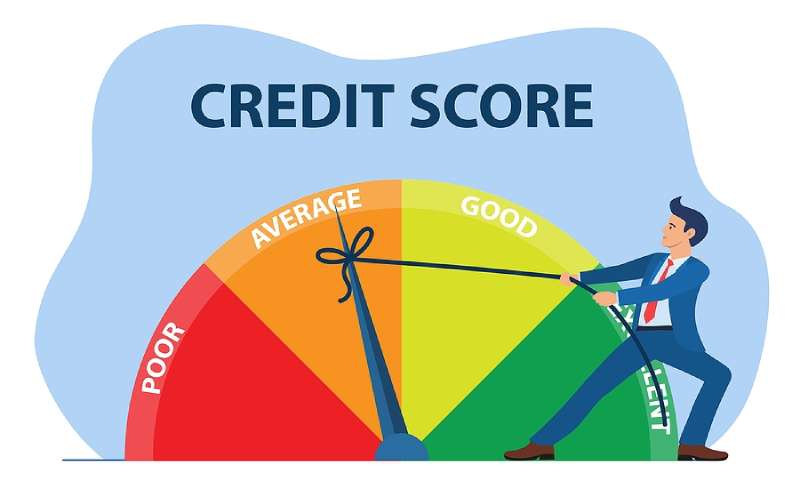Credit scores impact our lives in more ways than you might imagine, yet, unfortunately, they are complicated and can be difficult for any individual out there.

In this article, we’ll clear up what credit scores are, why they are so important, what are good credit score ranges, what are bad credit scores, and how to improve your credit score.
What is a Credit Score?
A Credit Score is a 3-digit number that ranges from 300 to 850 that represents your credit risk or indicates a person’s creditworthiness. Simply put, a credit score is a numeric metric that determines how likely you are to pay back a loan.
Generally, your financial institutions and other lenders use this numeric value to evaluate how responsible you have been at borrowing money.
Your credit score comes to play when you borrow money from a financial institution. The higher your score, the more lenders will want to work with you. Also, the rate at which you will get your loan/credit is determined by how good your credit score is.
Fair Issac Corp. (FICO) and VantageScore Solutions are the leading credit scoring companies in the U.S.
Benefits of Higher Credit Score
If you have a really good credit score, you’ll have a very low-interest rate, which means the cost of borrowing for you is cheaper.
Higher Credit Score Equals Lower Credit Risk
The better your credit score, the easier it is to get a lower interest rate and a bigger loan from a mortgage lender.
What is a Good Credit Score?
Generally, credit scores between 670 and above are considered good credit scores. To be more specific scores between 670 to 739 are considered Good; 740 to 799 are considered Very Good, and 800 and up are considered Excellent.
The below-par score ranges of less than 579 are considered Poor; whereas 580 to 669 are considered Fair.

What are Credit Score Ranges?
FICO scores and VantageScores range from excellent to very poor:
| FICO | VantageScore | |
| Excellent | 800-850 | 750-850 |
| Very Good | 740-799 | – |
| Good | 670-739 | 700-749 |
| Fair | 580-669 | 650-699 |
| Poor | – | 550-649 |
| Very Poor | 300-579 | 300-549 |
Read More: Top 4 Biggest Money Mistakes People Make in Young Age
What is a Bad Credit Score?
Credit Scores of 570 and below are considered bad credit scores. An individual having a bad credit score often have difficulty getting credit and even if they get they are more likely to get higher interest rates than those with good or excellent credit scores.
Consequences of Bad Credit Score
Bad Credit scores can have serious consequences on your finances such as:-
- you may have to pay more for your loan (higher interest),
- your insurance premiums may go up,
- you might miss out on career opportunities,
- you might find it difficult on renting an apartment, and many more.
What causes Bad Credit Score?
Here are some of the things that can lead to a bad credit score:
- Missed or Late Payments
- Bankruptcy
- Identity Theft
- Foreclosure
- Judgments
- Not enough accounts in your credit mix
- Low account age
- High Credit card balances leading to high credit utilization
Does the credit score affect my interest rate?
Yes, it does affect your interest rate. The rate at which you will get your loan/credit is determined by how good your credit score is.
Higher your score, the better the terms of credit you are likely to receive.
Example: If you have a really good credit score, you’ll have a very low-interest rate, which means the cost of borrowing is cheaper.
What Credit Score is needed to buy a house?
Your credit score is a very important consideration when you’re buying a house because it shows your credit history of how you’ve handled the debt.
It’s recommended that you have a credit score of 620 or higher when you apply for a conventional house loan. If your score is below 620, lenders either won’t be able to approve your loan or may be required to offer you a higher interest rate, which can result in higher monthly payments.
So it is important that you have a good credit score to buy a house as it makes the entire process easier and more affordable – the higher your credit score, the lower the mortgage interest rate you’ll qualify for.

How To Improve Your Credit Score
If you want to qualify for any type of loan and your credit score isn’t up to par, you can take actionable steps to increase your credit score.
Tip #1: Pay Off Outstanding Debt
One of the best ways to improve your credit score is to identify any outstanding debt you owe and make payments on that debt until it’s paid in full. This is helpful for a couple of reasons. First, if your overall debt responsibilities go down, then you have room to take more on, which makes you less risky in your lender’s eyes.
Second, it improves your credit utilization ratio, or how much you spend compared to your total credit limit. Lenders look at this ratio to determine whether you’re a risky or safe borrower. The less you rely on your card, the better.
Tip #2: Keep Your Credit Utilization Low
It’s generally recommended to keep your credit utilization below 30%. If you’re using a high percentage of your available credit, try to pay down your balances or consider asking for a credit limit increase.
To get your credit utilization, simply divide how much you owe on your card by how much spending power you have. For example, if you typically charge $2,000 per month on your credit card and divide that by your total credit limit of $10,000, your credit utilization ratio is 20%.
Tip #3: Pay Your Bills On Time
This is the most important factor in your credit score, so it’s crucial to pay your bills on time every month. A large part of what a lender wants to see when they evaluate your credit is how reliably you can pay your bills. This includes all bills, not just auto loans or mortgages – utility bills and cell phone bills matter, too.
If you have trouble remembering to pay your bills, consider setting up automatic payments or setting reminders for yourself.
Tip #4: Don’t Apply for Too Much Credit
Opening too many new credit accounts in a short period of time can hurt your credit score. You should resist the urge to apply for more credit cards because this puts a hard inquiry on your credit report. Too many hard inquiries can negatively affect your credit score.
If you do need to open a new credit account, be sure to shop around for the best terms and only apply for accounts you need.
Tip #5: Dispute Errors on Your Credit Report
If you find errors on your credit report, it’s important to dispute them with the credit bureau. This can be done online or by mail.
Tip #6: Consider a Credit Repair Service
If you have a lot of negative items on your credit report, you may want to consider a credit repair service. These companies can help you dispute errors and negotiate with creditors to have negative items removed from your credit report.
The Bottom Line
In conclusion, your credit score is an important factor in your financial life, and it’s worth taking the time to understand and improve it. By paying your bills on time, keeping your credit utilization low, avoiding too many new credit accounts, and disputing errors on your credit report, you can take steps to improve your credit score and achieve your financial goals.
The Invest Freak is not a financial advisor, so it’s best to consult a professional for help repairing your credit.
If you are not familiar with Credit Reporting and Repairing Companies you should try them. They will assist you in fixing your credit report. They will help you in increasing your credit score.
You can try these companies for your professional help.
- The Credit Pros – The Credit Pros was ranked by INC Magazine as one of America’s 5000 Growing Credit Repair Services Companies. With A+ BBB Rating and serving the country for more than 13 years. Get a FREE Consultation here >> The Credit Pros
- Tradeline Supply Company – A credit-building strategy that has benefited primarily the privileged for over 40 years. Tradeline Supply Company, LLC aims to promote equal credit opportunity by making this option available to everyone.


